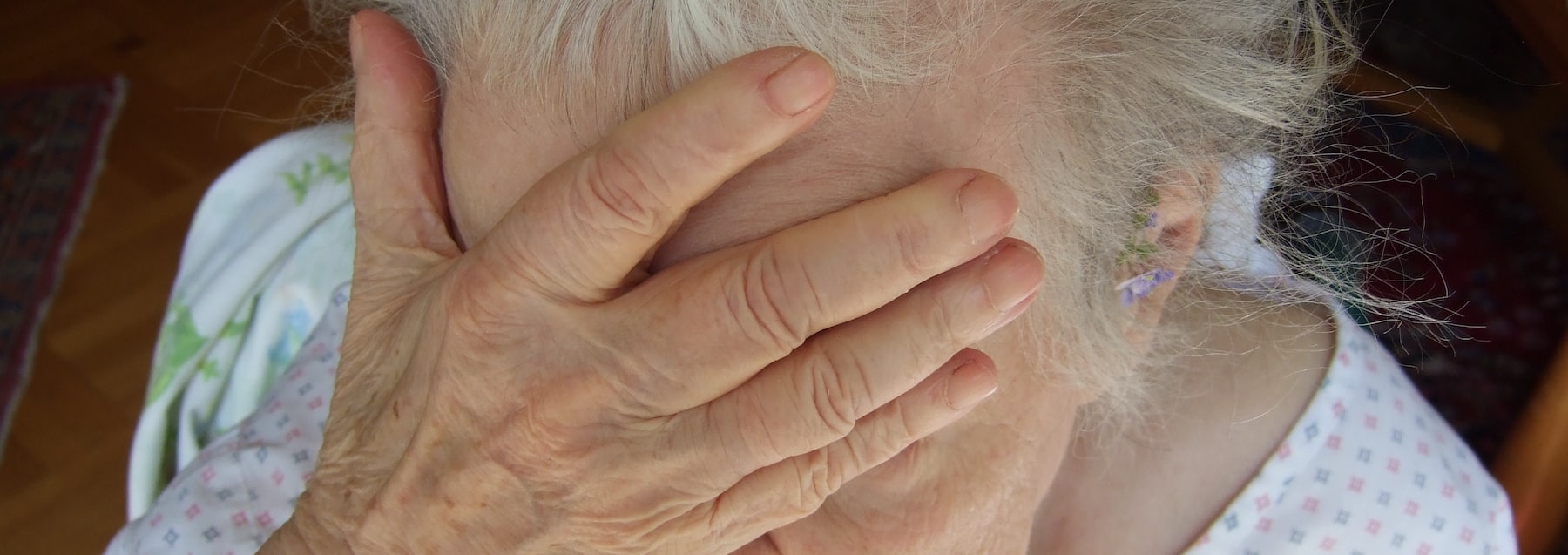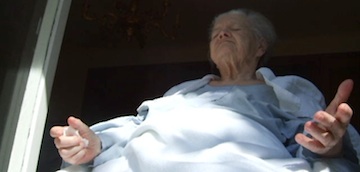
Remembering: The Garden
Stubbornly I kept trying the wheelchair. On Sunday, April 25, we made our last attempt. I took Oma into her garden for a few minutes. She just could not appreciate it. I have a video of one of our forays. I’m not sure why I made it except perhaps to remind me of how simultaneously beautiful and awful this time was. It was such a privilege to be able to sit with Oma in this time. But so hard to bear the suffering. Looking at these images now, it is hard to imagine we believed she had any interest in recovery.

I warn you, watching this video is very difficult. It does, though, give you a sense that spring had sprung, that Alex and Anna and I were present and attentive, but that even so Oma was fading away. “Bitte ins Bett,” please, in bed.
This sunday the itching continued to be terrible for Oma. We tried to reach Dr. B or Dr. D but had no luck getting either to the house. We finally resorted to calling the hospice doctor. Dagmar had arranged to have Oma followed by the “mobile hospice” in Vienna, and their doctors, a rotating set of six or seven, were always on call. This Sunday the mobile hospice doctor came and reviewed all the medications that Oma was on. She thought that the medications indicated a kind of schizophrenic approach on our part. On the one hand we had brought Oma home saying that she was prepared to die at home and a palliative approach was our goal, on the other hand the medications indicated an ongoing battle toward a recovery. As we listened to the hospice doctor we realized that we had to come to peace with a choice here, that Oma had to come to peace with a choice.
Somewhere in these days I sat by Oma’s side and tried to have a frank talk with her. I pointed out that when she asked doctors for relief, they would do what they could to keep her going and that would involve more medicine, more infusions, possibly even a return to the hospital. I told her that if she really wanted peace, she had to say no to this, it was OK for her to let go. We could give her medication for the pain, but we didn’t have to do all the rest.
Oma seemed frightened of something. At night I would sometimes come down to her bed and find her mumbling prayers, I could make out “Mutter Gottes” so maybe these were Hail Marys (“Mother of God”). I didn’t know what scared her, but I know her life had plenty of blemishes, and perhaps she was afraid of what waited her on the other side of death. Whatever it was, I got the clear impression she was fighting it, she was afraid of it. My mantra became, “it is OK, we will be OK, Oma, everything is good” to try to help calm her.
The hospice doctor removed Oma’s catheter, noting that it just made us obsess about things we had no control over. Oma had been asking for the catheter to be removed for weeks, was it really so simple? She told Anna that we could stop with the constant measurement of vitals (blood pressure, pulse, blood sugar) which Anna had been recording so carefully. I asked her to mark the medications she suggested we drop so I could discuss that with Dr. B, which she did. And she started Oma on morphine and left us with a small supply to continue. She brought peace to the house and relief to Oma, within hours the mood had shifted, much of the tension began to leave us.
The next day, a year ago today, on April 26, I wrote this note to family. I think it conveys this stage of our journey well, so I will let it stand on its own:
Needless to say, the roller coaster continues with Oma. This week has seen some highs, like a few trips in the wheelchair, including one visit to the garden for almost an hour, and lows, like a horrible battle against itching that was driving Oma mad. My very description of these events as highs or lows, though, betrays a perspective that may not be at all valid from Oma’s point of view. It is all but impossible to understand the world as she sees it, but I am pretty sure she would describe the week quite differently.
Take the wheelchair… The doctors D and B and the physical therapist all stress the importance of exercise and getting out of bed. Her condition can’t improve without this work. Getting her into the wheelchair was, from this perspective, a victory. But Oma never wanted to do this. She hated the idea from the get-go. The whole time she was in the wheelchair she begged to be put back in bed. After a few days she accepted the inevitability of it, we insisted after all, and even ate breakfast with us in the wheelchair at the table. But when I’d take her to the garden she would complain that she couldn’t see anything properly or hear the birds. She did not seem to enjoy the sunlight, the shade, the breeze, or her beautiful garden. She would moan and when words came out they would be simply, “please put me back in bed.” our victory was her defeat.
This confused me, because when I asked her what she wanted for her future she would tell me that she wanted to get out of the bed. When I explain that out of bed means exercise today, wheelchair today, some hard work and, yes, some pain so that her muscles become strong again, she says, “no, not today, tomorrow, today I want peace.” So, really, what does she want?
The itching that started on Friday was fierce. It started on the soles of her feet and spread up her legs and to her bottom. We tried creams, gentle scratching, water, ice, everything we could think of to help her though the itching. Really, none of this helped much. By Saturday she was in such agony over the itching that she insisted we call the doctor, which made sense. She spoke herself with Dr. D on the phone, explaining how terrible this was and that she needed his visit. He told us to give her three more doses of Lasix which would help bring water out of her system, and said he would visit that night or at latest the next morning. We have not heard from him since. After a terrible Saturday night, we called the hospice doctor on Sunday. She came by twice. By the second visit it was clear that we had to do something more drastic if Oma was to have peace. The doctor gave Oma a shot of morphine. We also removed the catheter, something Oma had been asking for for quite a while. Oma soon fell into a deep sleep, breathing and snoring like I have not heard in a long time.
This felt like a failure to me, the morphine made Oma disappear a bit. She does not seem to recognize me as well, she certainly cannot speak as well. To some extent, we’ve lost her in this condition. But I imagine she might feel quite differently about this. All she has asked for for weeks is some peace. She wants us to leave her be, certainly in this condition physical exercises are the furthest thing from our mind. She has some peace.
So my view of the world and the week is quite different from Oma’s, I imagine. When friends call the house and ask “how is she doing” I hardly know what to say. I’m not at all sure what direction is up any longer. This morning, as the morphine began to wear off and the other pain drops had yet to take hold, Oma was again very agitated and clearly in pain. This time, though, she could not really communicate very clearly about the situation, her speech was still hindered by the morphine, I suppose. I ended up for the first time really praying over her. I prayed out loud, but not loud enough for her really to hear. I prayed to Utzi (Dagmar’s sister) that she help her mother let go and find a way to rest, to Uroma (Oma’s mother) that she welcome her daughter home, and to the mother of God that she grant Oma peace. As I mumbled these prayers over Oma she stilled and fell deeply asleep. It is hard for me to pray, since I am not even sure in what I believe, but I do know that I believe Utzi helps me. And I do think Oma believes in the power of prayer. Maybe Oma heard me, maybe Utzi heard me, maybe God had mercy… In any case, maybe I should pray some more!
So now we see if we can bring the other doctors really on board with the notion of purely palliative care for Oma. The house doctor is understandably reluctant about the idea. He wants to watch here blood values and adjust her medications to improve the chemistry as much as possible. I think we need to let go of as much of that as possible. The hospice doctor was wonderful, I hope we can leave Oma more in these caring hands, hands that think only of her wishes and comfort, hands that do not feel compelled to apply all human wisdom to the task of prolonging life. After all, Oma has a family on both sides of this border, maybe they are as eager to welcome her as we are reluctant to let her go.

This post is part of my Remembering Oma series, which recounts the weeks I spent with Oma in 2010 as she died at home. Previous: The Battle. Next: Utzi, Opa, and Trude.